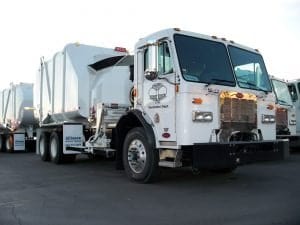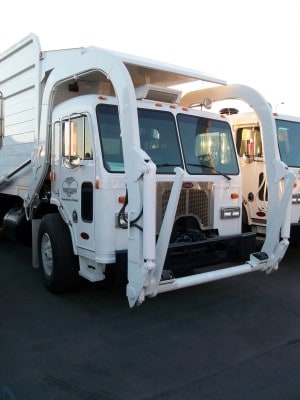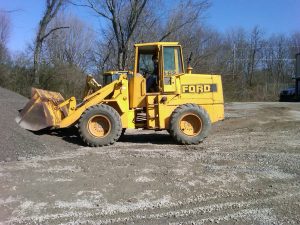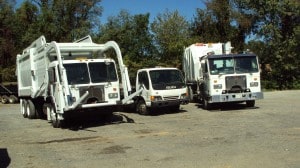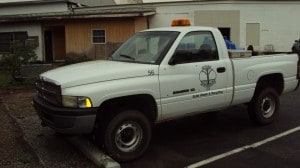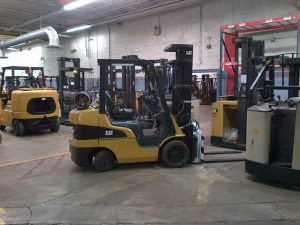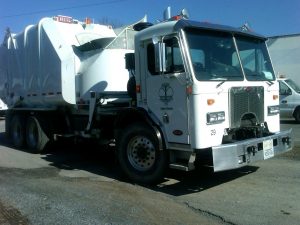Pro-active in the approach to their employees, surrounding community and programs, Jonesborough, TN’s Solid Waste Disposal Department ispushing the needle from complacency to innovation.
Established in 1779, Jonesborough is Tennessee’s oldest town with a rich history of public services. Law records from the 1800s mandated that every able-bodied male spend two hours per week cleaning up the streets and hauling away trash, although it was highly rumored that most hired someone to pull their two hours for them. In turn, the public waste disposal program was created. Today, the town’s Solid Waste Disposal Department has become one of the premier examples of good stewardship and responsible waste disposal covering the entire spectrum of community waste and a population of about 4,800 Household garbage, light industrial and commercial waste are managed alongside some of the more reclaimable waste such as recyclables, leaves and brush which are all handled through the system.
A Pro-Active Approach
According to Gary Lykins, Fleet Manager for the Solid Waste Disposal Department, the state of the economy has affected all operations in the public and private sector. “Some of the most visible differences are the price of tires, fluids and of course fuel. The price of petroleum products can be loosely tied to economic conditions but the main focus for a public sector operation is keeping cost low when customers are struggling with all their bills.” He points out that the Town of Jonesborough has a governing body that has shown extraordinary efforts to be progressive while keeping costs down for the residents. Not only is there a recycling discount in place that gives a $2 credit to the residents that choose to participate in the curbside recycling program, but recapped tires, optimized routes and engine computer control programs have also lowered operating costs while greatly reducing down time.
The Solid Waste Disposal Department’s Director, Jeff Thomas, explains that the town of Jonesborough has also been pro-active in their approach of involving the employees in safety related training programs. “These programs are designed to promote the safety and health of employees. By promoting and encouraging our employees to be cognizant of unsafe practices, the number and severity of work-related injuries and illnesses are dramatically reduced.” He goes on to say that reducing on the job injuries are a direct co-relationship to worker’s compensation insurance claims being diminished. “Our wellness program for employees is another added benefit our organization uses to promote health and safety concerns. It allows an employee and their family members to use the services for any reason emotionally and physically related to stress or other concerns, in a confidentiality situation.”
In addition, Thomas encourages members of the department to participate and become engaged with improving and educating their surrounding community’s environment. In fact, he recently recommended to the town’s Mayor and Council members that Jonesborough become an affiliate of “Keep America Beautiful/Keep Tennessee Beautiful”, an organization that represents the core values of Litter Prevention, Waste Reduction & Recycling, and Beautification and Community Improvement. “Although, Jonesborough already participates in these core values, KAB offers important resources and guiding principles, which will enhance our vision.”
A Tidy Operation
Lykins says that right now the industry’s number one challenge is to push the needle from complacency to innovation and become leaders in the waste industry. “Far too often it is said that the refuse collection industry is a necessary evil and it is just best to look away and let it get done. In our case the elected officials, management and operators are engaged in making this the best solid waste department it can be.”
An overview of the Solid Waste Disposal Department reveals a tidy little operation—one automated side loader with about 2,000 stops per week, one front loader with 116 commercial dumpsters (most dumped multiple times per week) and a converted landscape truck for curbside recycling. One of the main challenges Jonesborough has encountered is the expense of collection equipment. “Refuse trucks are in the $250k ballpark and the operational costs are enormous,” says Lykins. “Given the nature of a refuse route’s everyday operation in all weather conditions, all traffic scenarios and all volume swings, it is imperative to have a solid truck ready to go to work. Keeping this equipment in a state of readiness is perhaps the biggest challenge of any refuse operation, but doing it with minimal or no backup equipment requires an airtight maintenance program.” Jonesborough’s operators are the front line in the program’s maintenance process map and their maintenance education has been a huge credit to the department. Lykins says that properly trained operators are able to thwart the small problems and make the shop aware of impending failures. “Without this front line we could not hope to have dependable long lasting equipment.” Daily checks include fluids, lights and steering components, however, Lykins says that the real benefit is “operator ownership” of the asset. The pre- and post-trips are handled by the operator and regular service intervals are observed. The trucks are equipped with pneumatic grease guns and tires are monitored daily. “Tires are changed in axle sets according to tread depth. Axle tires with the same tread depth last longer. If a tire set has just 5 pounds of pressure difference, it will drag 87 feet for every mile driven. It is a fact that matched axle sets keeps cost down,” stresses Lykins.
During the Department’s 2011/2012 fiscal year, they were faced with the imminent demise of their current automated side loader. At 11 years old, the body had literally cost tens of thousands of dollars in repair over the previous two years and the constant downtime was a major inconvenience to the operation. “At a price tag of $225,000 to $275,000, a new automated side loader is a major concern in an airtight $500,000 per year budget. We had to think outside the box,” says Lykins. “Who would have thought that one day a fleet manager would be asked to search for ‘used’ sanitation equipment. The Solid Waste Disposal Department has recently purchased, traded or rebuilt their small but vital sanitation department. At the behest of our ever-vigilant Mayor, fleet management was given the awesome responsibility of reinventing the department through equipment purchases.”
Lykins explains that the Department purchased a 2008 Peterbilt fitted with a refurbished automated side loader with only 400 miles from Alliance Refuse Trucks in Arizona for $165,000. Their 2002 Peterbilt automated side loader only had 80,000 miles on it so Lykins sent it to Alliance Refuse Trucks to be fitted with a Heil front end loader body. In exchanged for the front end loader body, installation and transportation, they traded their 2006 international 7900 with a Heil 5000 rear loader body (independently valued at $65,000). This move allowed for a vacant position in the sanitation department in which they could make additional equipment purchases as needed, including a fleet of 116 dumpsters that was estimated to cost more than the truck. However, the Department found a place in Bristol, IN that would take their rear loader bins in on a trade value and then sell them front loaders to match at a quantity discount rate. “So with a little creativity in freight we have more than $90,000 dollars in dumpsters for around $40,000,” says Lykins. Now, all that was left was purchasing a truck for their curbside recycle service and a 2004 Isuzu NPR fit the bill. “It was already fitted with a landscape bed and we up-fitted with separate bins for the curb sort recycling. We spent a great price on it—$6,600,” says Lykins.
Keeping Costs Low
One of the Solid Waste Disposal Department’s current challenges includes keeping costs low in the face of rising fuel and landfill costs. One of the innovations within the department has been an alternative landfill site. Eco-Safe Environmental (Advance Disposal) in Sullivan County open in September of 2012. Before that, the disposal site for all municipal solid waste was being transported to Iris Glen. Says Thomas, “The decision to transport all MSW to Eco-Safe in October 2012, was simply an economical and business decision. The new site is a conversion landfill that is using the cellulose in the garbage to make methane and other products. They charge less per ton and it is easy to make an environmental case for dumping there.”
Lykins explains that reducing the waste stream is another way to reduce costs. “Our recycling program recently got a little boost from big brother by putting RFID tags on the recycle totes and scanning them each time the recycling is picked up at the curb. The scanned information is kept in the billing office and a $2 discount is applied to their bill for the customers’ efforts.” Although some money may apply in the sale of recyclables, the real value comes from the reduction in tonnage. “Our recyclable materials are worth the $32 per ton in discounts before the first aluminum can or cardboard box is sold to the recycler.”
Towards the Future
The Department is currently looking into a partnership with a private company to further reduce their tonnage with the collection and composing of food waste. Although the the Department is no stranger to composting, the collection process for food waste has always been a hurdle. Says Lykins, “In the future we hope to find a way to productively make food waste and cooking oil collection a reality.”
For more information on the Town of Jonesborough Solid Waste Disposal Department, contact Jeff Thomas at (423) 791-3813 or via e-mail at [email protected].

